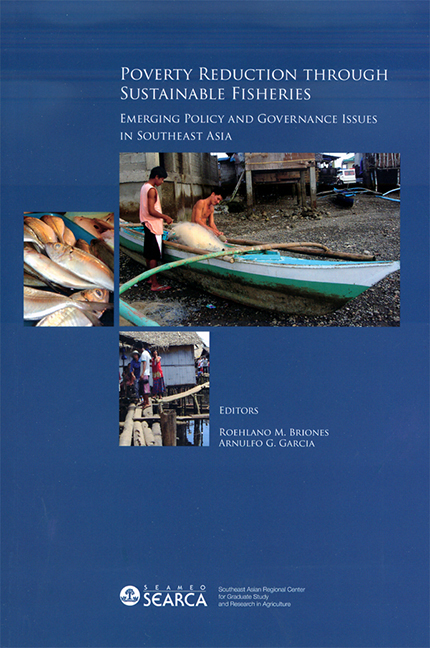 Poverty Reduction through Sustainable Fisheries
Poverty Reduction through Sustainable Fisheries Book contents
- Frontmatter
- Contents
- Figures
- Tables
- Foreword
- Acknowledgments
- 1 Introduction and Synthesis
- 2 Fish and the Poor
- 3 Fish and the Poor: The Case of Cambodia
- 4 Changing Demand and Supply Structure of Fish in Asia: Past Trends and Future Projections
- 5 Regional Economic Integration of the Fisheries Sector in ASEAN Countries
- 6 Technology Policies for Capture Fisheries and Aquaculture in Southeast Asia
- 7 The Status, Current Trends and Future Directions for Production and Technology of Fisheries in Southeast Asia
- 8 The Seafood Supply Chain and Poverty Reduction
- 9 Strategy for the Empowerment of Aquaculture Fish Farmers in Indonesia
- 10 Status of Coastal and Marine Resources: Implications for Fisheries Management and Poverty in Southeast Asia
- 11 Property Rights and Institutional Arrangements in Southeast Asian Fisheries
- 12 Regional Cooperation in Aquatic Resource Management for Southeast Asia
2 - Fish and the Poor
Published online by Cambridge University Press: 21 October 2015
- Frontmatter
- Contents
- Figures
- Tables
- Foreword
- Acknowledgments
- 1 Introduction and Synthesis
- 2 Fish and the Poor
- 3 Fish and the Poor: The Case of Cambodia
- 4 Changing Demand and Supply Structure of Fish in Asia: Past Trends and Future Projections
- 5 Regional Economic Integration of the Fisheries Sector in ASEAN Countries
- 6 Technology Policies for Capture Fisheries and Aquaculture in Southeast Asia
- 7 The Status, Current Trends and Future Directions for Production and Technology of Fisheries in Southeast Asia
- 8 The Seafood Supply Chain and Poverty Reduction
- 9 Strategy for the Empowerment of Aquaculture Fish Farmers in Indonesia
- 10 Status of Coastal and Marine Resources: Implications for Fisheries Management and Poverty in Southeast Asia
- 11 Property Rights and Institutional Arrangements in Southeast Asian Fisheries
- 12 Regional Cooperation in Aquatic Resource Management for Southeast Asia
Summary
ABSTRACT
Fish stocks are widely reported to be in decline in many of the world's oceans and inland water bodies. While this poses significant environmental problems, a major concern is the impact of these declines on millions of people who depend on fish as a source of both food and livelihood. Efforts to manage fish stocks for sustainable production have, in the past, focused on maintaining optimal productivity by managing fishing effort and catch limitations. More recently, acknowledging the intrinsic role of humans within the fisheries system has led to a more inclusive approach to integrate social, economic, and biological objectives within fisheries management. Today, the particular importance of fish and fisheries to the world's poor suggests a need to take a pro-poor approach to fisheries management to ensure that benefits from remaining fish stocks continue to contribute to food security and livelihoods of the poor.
To effectively improve fisheries management for the benefit of the poor, this paper argues that management approaches must address the inherent complexity and heterogeneity found in fisheries, and the differing needs of both fishers and non-fishers, for whom fish plays a role as a source of food, income, and employment. We conclude that understanding the diverse nature of fishery activities and the role they play in rural livelihoods is essential if we are to avoid making potentially damaging assumptions about the nature of fishing and the contribution of fish to the lives of the poor, leading to unintended interventional outcomes. We also argue that fishers are not passive beneficiaries of interventions, but rather ‘drivers of change’ responding to the opportunities and constraints with which they are presented.
INTRODUCTION
As fish stocks are reported to be in decline throughout many of the world's oceans and inland areas (e.g., Worm et al. 2006; Wong et al. 2007; Garcia and Newton, 1997), concerns have been increasing in recent years not only for the environmental impact of such declines, but also for the potential effects of fish stock decline on the millions of people around the world who depend on fish as both a source of food and livelihood.
- Type
- Chapter
- Information
- Poverty Reduction through Sustainable FisheriesEmerging Policy and Governance Issues in Southeast Asia, pp. 15 - 38Publisher: ISEAS–Yusof Ishak InstitutePrint publication year: 2008
